An Interview with David Rodriguez, PCC
By Adrienne Harvey, SrPCC, RKC-II, CK-FMS
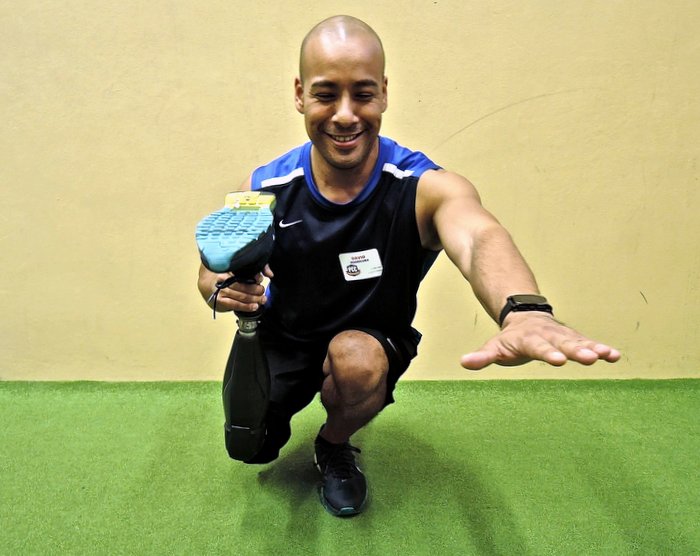
Dragon Door: How did you first become involved with fitness?
David Rodriguez: I was always pretty active. In high school I was a runner and much thinner since all I did was run. I didn’t get involved with weight training until after I graduated from high school. Then, I joined the military—the Air Force—and was a firefighter. At that point I started lifting weights and fell in love with it. I enjoyed fitness and working out. Since then it's grown and evolved as I’ve learned about different training techniques like kettlebells and
calisthenics which have greatly improved my wellbeing, physique and fitness level. It's been great!
Dragon Door: Since we were at the PCC, kettlebells hadn’t come up in conversation before, how are you using them?
David Rodriguez: I first heard about kettlebells through the Joe Rogan podcast, who was very much into Dragon Door. I had seen them before but didn't realize how much difference there was between kettlebells and dumbbells. Now I know there's a huge difference.
Kettlebells are fantastic for full body functional training. It’s really helped me a lot, especially being an amputee, kettlebells have served me very well for functional training.
Dragon Door: How did you train after recovering from surgery?
David Rodriguez: Basically, I continued training after I was diagnosed with cancer on October 15th, 2003—which was how it all started. I was diagnosed with synovial sarcoma, a rare form of cancer. It started in my knee and from there I had to go through chemotherapy, surgery, but then from that point on I had a lot of complications with infections and a lack of mobility in the knee. But, I always kept working out and tried to keep training in my life. I think that really helped get me through and recover faster from surgery.
When I had the amputation, it brought about a new challenge since my biomechanics and balance were now much different. I had to figure out different ways of using my body, and relearn how to do things. And I am still progressing and evolving. The more comfortable I get with the prosthetic, the stronger I get, and I can do more. My movements change with my fitness level.
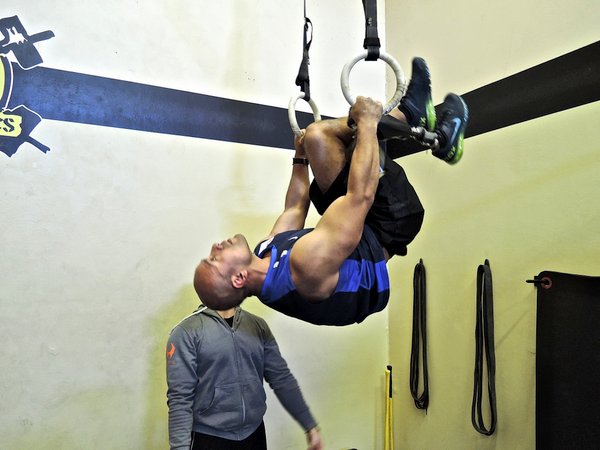
So I’ve learned many different modifications over the years, but it has also been a lot about educating myself. Before, I was a big advocate of weight training, and it was all I knew. Then I started discovering different fitness approaches like kettlebells and calisthenics. I realized that there was much more to fitness than weight training. I believe that every type of training serves a purpose, but for me—as an amputee—functional movement works a lot better than just trying to bulk up. I need
flexibility and to be able to move around. I have two little girls to keep up with, bend down with, and carry. I can't be a big bulky guy who can't get down and play with them. That's where kettlebells and calisthenics have really helped me a lot.
Dragon Door: In a previous conversation you mentioned wanting to train others, but what is your main job?
David Rodriguez: I was a firefighter for 8 years before I medically retired. Right now I'm a fire inspector. I also am thinking about getting into
personal training for people who are recovering from surgery for amputations or any kind of disability that might be brand new to them. I think calisthenics would be the best way for them to start because of how progressive/regressive it can be. Calisthenics can be modified to suit any fitness level, and I think that when I was trying to learn new ways of moving, I would have been better served if I had been training with calisthenics with all of the small steps to build on. Weight training still got me through, but my fitness level was already pretty good at the time. Someone new to fitness also trying to learn to work with a new disability would not necessarily have the same experience I had with weight training.
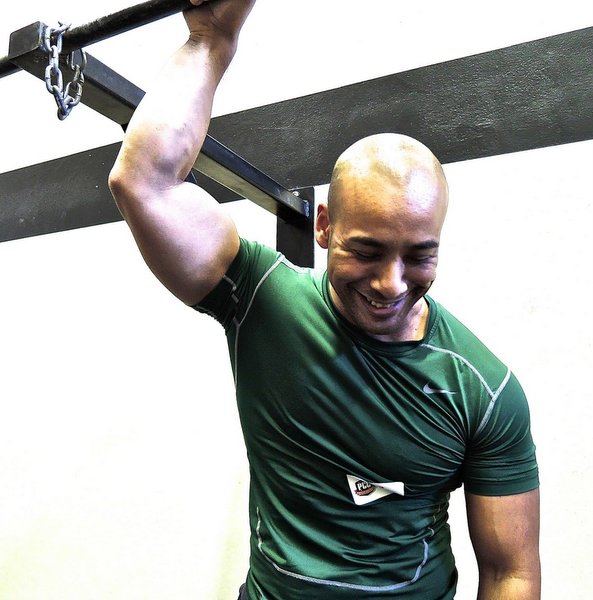 Dragon Door:
Dragon Door: What drew you to the PCC?
David Rodriguez: I saw it in
TRAIN magazine which also had a couple of things in there about
Convict Conditioning and then I saw it on the Dragon Door website too. Around the same time, I was really getting into calisthenics because I’d read
Convict Conditioning and was blown away. I thought, "I want to be strong like that!" And the way Paul "Coach" Wade writes, it all sounds so awesome. When I saw the
PCC workshop offered, I wanted to try it. I had never done a workshop like this before. This was the very first time I have participated in a workshop like this because I can figure out how to do certain things on my own and I have been able to educate myself about fitness.
But I thought this was something I needed to do. I wanted to really learn and be around people I could talk to, especially because I am trying to adapt the training to my disability. I hoped that that the coaches could give me ideas to try, and that was exactly what happened at the PCC. It was great!
Dragon Door: What was your favorite move from the PCC?
David Rodriguez: I really enjoyed learning "skin the cat" and the levers, even though I wasn’t able to do the back lever yet. But just getting to see how it and the front lever were done was helpful. I also enjoyed learning about the L-holds, elbow levers, muscle ups, and flags. I knew how to do the clutch flag, but getting to see the
press flag in real life was really cool. A week or two later I after the workshop I tried the press flag and was able to pull it off!
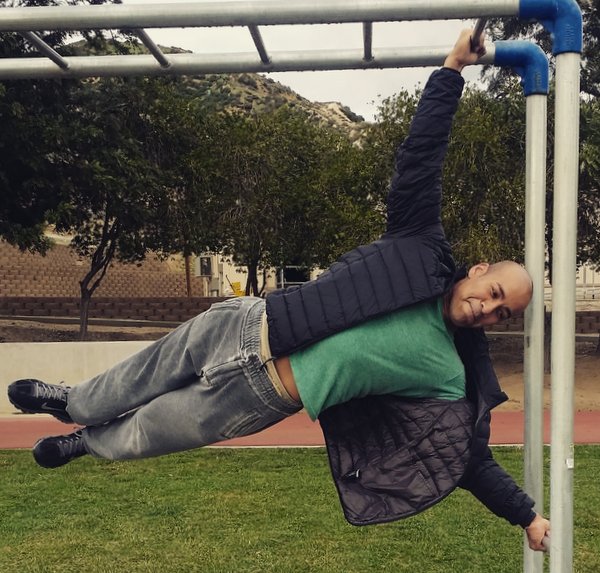
I also enjoyed doing the headstands and going into the handstands. I have been able to do headstands before, but only without my prosthetic on, but now I can do them with it on which was really cool. I also learned how to progress to handstands with assistance.
Dragon Door: What’s your advice for someone considering the PCC?
David Rodriguez: I would highly recommend it, I got a lot of feedback and encouragement. The participants supporting each other also created a really good environment, especially for someone like myself. I know I am a little bit different, but I never felt like I was different when I was at the PCC. Everyone was very encouraging. It took a little bit of faith to put myself out there, but I felt like I needed to do it.
For anyone who loves calisthenics or wants to learn how to do good functional training, the PCC is a very good education—with practice and a lot of feedback. If you have some kind of issue or concern, the coaches will help you find a way.
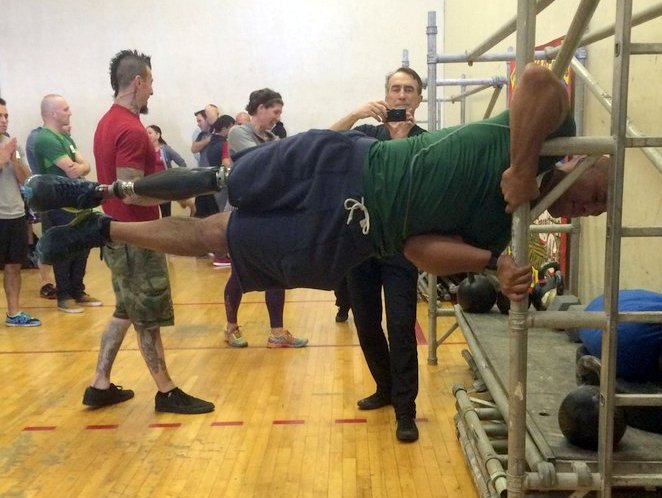
Dragon Door: Your Century Test was great, how did you prepare?
David Rodriguez: I didn't do anything too specific for it, because I felt like my fitness level would get me through it. The only concern I had was with my prosthetic and if I should wear it or not. I contacted Al before the PCC and asked him what he thought, and he said it would be fine either way. I hoped I would be able to perform the moves the way the coaches wanted it done or as close as possible. I knew I needed to break parallel with the squat, and I tried my best to get down as far as I could, but that was one of the things I had to worry about as an amputee. During the
hanging knee raises, I started to feel the prosthetic slide off my body so I had to flex even harder to just keep it on—after a while, gravity can start to work against me. During the pull ups, I knew I just had to get it done!
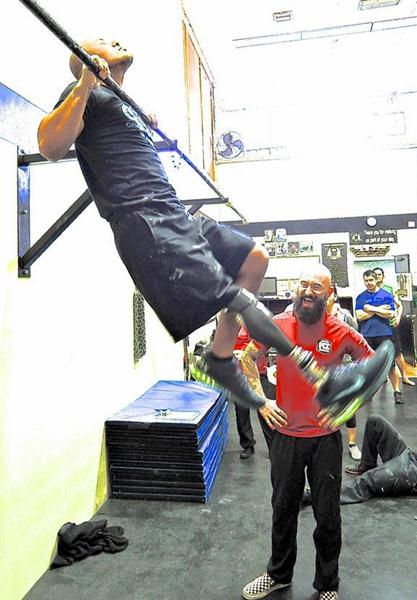
Dragon Door: What's next for you? Are there any new fitness goals you're working on or towards?
David Rodriguez: Yes, I was going to participate in the CrossFit Open this year, but broke my arm while training. I will compete in it next year. This year will be the first time CrossFit is having an open event with the ability to scale back the workouts. I follow an organization called I Am Adaptive, which has many people with different types of physical disabilities. Some are in wheelchairs, and have had amputations—arms, legs, sometimes 2 or 3 of them. In the group, there are all kinds of people of different abilities who all love fitness and are dedicated to it. On one of the days at the Open, I Am Adaptive will do the workout at the same time to raise awareness. Some of the people in the group are very impressive. I had also been training for a sprint triathlon which I had to miss because of my injury.
I very recently broke my arm in the middle of my fourth rep when doing muscle-ups. The set was going well, and I was going fast, I just wanted to get that fourth rep no matter what. But, when I went up for it, my arm got in a bad position, and I just decided to muscle through it. I heard a snap and felt a rush. My first thought was that I got the rep as I lowered myself slowly using mostly my right arm. Then I looked down and saw my other arm just hanging there. Then the pain hit, but I controlled my breathing, calmed myself down, and the paramedics took me to the ER. At the hospital they were surprised to see that I had a Holstein-Lewis fracture which usually only happens to competitive arm wrestlers and young pitchers learning to throw curveballs.
Most people aren’t as stubborn as I am, and I had made the decision to get that 4th rep. Instead of taking a break, I just forced the rep and put myself in a very compromised position. The next time, I know to just let go and try again after a break.
I’m already back to work, but will need three months to fully recover which isn’t too bad. Once the swelling is completely down, I’ll have a humerus fracture brace to wear for 2-3 months. Life happens. I will be putting my PCC bodyweight training to work for my recovery. I’ve already been working on and modifying a few moves here and there. It’s going to be a process, but I am looking forward to building myself back up with bodyweight training.
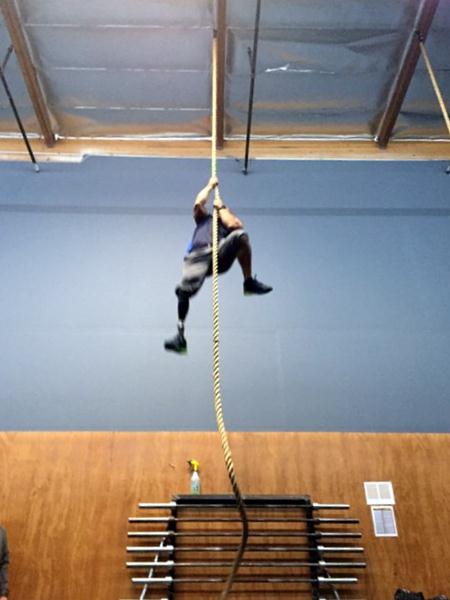
Dragon Door: How were you training for the sprint triathlon and CrossFit open?
David Rodriguez: I had been doing a lot of running and swimming while still training with calisthenics. I had to focus more on the swimming and running because I needed to get more comfortable with swimming and running. Running especially requires a lot of my energy. I try to incorporate all these different tools—calisthenics, weight training, kettlebells—into my workout and it's been great. Sometimes I'll use calisthenics for supersets—after benching, then I can do
push ups, one arm push ups on a ball, or archer push ups. If I'm short on time, then I can always do a calisthenics workout and just practice all the different moves.
Dragon Door: Can you share an example of one of your short calisthenics workouts?
David Rodriguez: Usually I will do something like a push up variation of the day, and since I love dips, I’ll do them in my kitchen on the counter. I can do pull ups on the staircase outside my door, where I can also practice my version of the front lever off the steps. Then sometimes I do some
bridging. I'll usually choose about 4 different exercises and practice each for three sets. Sometimes I'll also do squats without my prosthetic so I can get all the way down for a good stretch before coming all the way back up. That kind of squat with a bridge is great for me.
Dragon Door: How do you stay motivated with your workouts and as an athlete?
David Rodriguez: First of all, I am a man of faith—a Christian—and believe in God. I feel like I never would have made it through this journey if it were not for my faith. I also have two little girls who I love. I am trying to teach them and to be a good role model in academics, spirituality, and with being active. My daughters have started to get into it with me—if they see me do a handstand, then they want to get into a handstand themselves, and I help them. They can see my passion and want to do it too. I hope they develop the same passion for fitness that I have.
I feel like my disability has made me a better athlete because it forced me to really focus not just on heavy lifting, but to learn how to move more intelligently. I have emphasized the muscle-mind connection more since becoming an amputee. Being an amputee has really taught me how to be a better, more adaptable athlete with endless possibilities.
Back